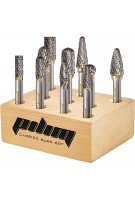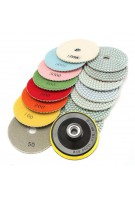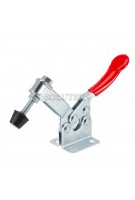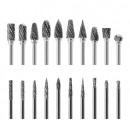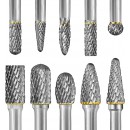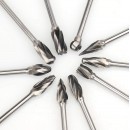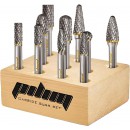Carbide burrs
Carbide burrs of different shapes
A burr is a universal tool for processing various materials: metal, steel, non-ferrous metals, cast iron, stainless steel, hardened steel, granite, ceramics, plastic, glass, tiles, porcelain stoneware, wood and other materials.
Burr design and types:
The design of a carbide burr consists of a shank and a carbide head of a certain shape soldered to it with copper or silver.
Types of burrs:
Burr type A – cylinder with smooth end
Burr type B – cylinder with end tooth
Burr type C – cylinder with spherical end
Burr type D – sphere
Burr type E – oval
Burr type F – rounded parabola
Burr type G – pointed parabola
Burr type H – torch
Burr type J – taper 60*
Burr type K – taper 90 *
Burr type L – spherical conical
Burr type M – cone
Burr type N – reverse cone
Burr type S – truncated cone
Burr type T – T-shaped
Burr type U – concave cylinder
Burr type Y – disc
In addition, there are several types of notches on the working part of the burr.
The most universal of them is “X” - notch (cross, double notch).
Single notch. Mainly used for processing non-ferrous metals (aluminium, copper, and other metals), the tool operates at lower speeds and does not stick with chips. A single cut with a large pitch is also used for processing non-ferrous metals; it removes more material in one pass. Works effectively on soft materials: plastic, wood, etc.
High performance
High wear resistance Tungsten carbide head
Rotation speed: up to 50 thousand revolutions per minute


